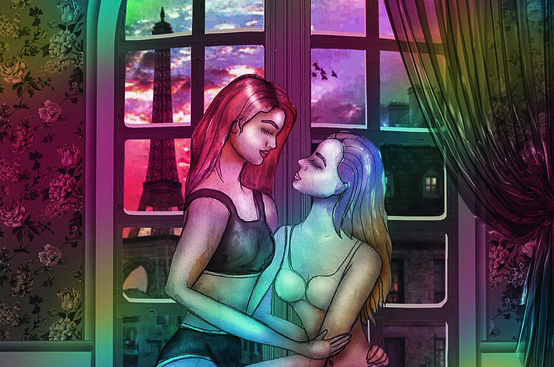*Ed’s note: names have been changed for confidentiality.
When Oscar walked into my office, I almost didn’t hear him over the sound of ringing phones, whirring printers, and beeping photocopiers.
A few feet away from me, the other bilingual case manager spoke Cantonese with one of her clients. The office smelled like pupusas, brought in by an older Salvadorian client earlier that day, as a thank you for our help with their Spanish to English interpretation.
One of my teenage clients, Oscar, usually came with his mom, but that day it was just him. He had something personal to talk about—something he was pretty sure his family wouldn’t understand.
Oscar was gay and not sure he wanted to be. He admitted to sometimes feeling like he carried around a “shame monster” inside his head.
I could very much relate.
~
2003 was when the “gay devil”—as I referred to him at the time—made his first visit, bringing with him a secret too big and corrosive for even the pages of my diary to contain.
On a trip to Mexico that year, he sat perched on my shoulder when out to lunch with my family at an outdoor taqueria. The girl at the table next to us had tan skin, brown-blond hair, and wore sunglasses and a spaghetti strap black tank top. He noticed her, and made sure I did too.
As the words, “she’s hot,” crash-landed from his taunting lips into my unsuspecting mind, I flinched—then turned around to make sure no one had heard. Luckily, no one had. My dad simply smiled kindly into my worried eyes, before passing me the bowl of tortilla chips.
Over the next few years, the gay devil made frequent reappearances, continuing to deliver crushes to me that I wasn’t willing, or ready, to identify for what they were.
He was often pretty rude in his delivery too. At a Stevie Brock concert for instance, when I realized that my feelings for one of his fan club members far surpassed anything the boy pop-star I outwardly ogled had ever made me feel, he taunted: “You’re not really here for Stevie, huh?”
At summer camp, after a girl I liked gave me a hug, he’d whisper: “You liked that a little too much, didn’t you?”
There were several reasons I didn’t feel safe coming out—not even to my own self—and I imagine that Oscar and other young queers struggle with some of these too.
One was that even though LGBTQ+’s had gained notable acceptance by the early 2000s, it still seemed like relatively few people were “out”—fewer still in high school.
Another was that despite my attending a fairly liberal one, high school felt to me like a place where going against the grain—no matter if your difference came in the form of sexual orientation, temperament, or the way you looked and talked—was to open yourself to judgment and ostracizing.
Some rare people are completely comfortable in their skins from a young age, blessed with rock-solid peer support groups and unshakeable self-confidence. I wasn’t one of them though, so I hoped I could “wait the gayness out,” as if it were a passing affliction that might resolve with time.
This concept of homosexuality as a sickness traces back centuries.
At one point, before it even started to be pathologized, it was simply so taboo that it wasn’t even spoken about. In Walt Whitman’s time for instance, no discourse existed for understanding or discussing it—for which reason Whitman himself remained in denial, despite developing attractions to the wounded soldiers he treated during the Civil War. It is believed he had many relationships with younger men, though his writing only implied, rather than explicitly stated this.
After Whitman’s time a dialogue around homosexuality finally began to emerge, but it was always in the context of illness. Psychiatrists like Richard von Krafft-Ebing described it as a “degenerative sickness.”
The homophile movement emerged in the late 1960s to early 1970s to fight back against this, promulgating the message “Gay is Good,” (inspired by the Black Pride Movement) and seeking to build gay culture by way of theaters, music, and newspapers, catering to the LGBTQ+ population.
The movement also promoted and encouraged gay affirmative therapies—whose goal was not to change, but be happy with one’s orientation—over gay conversion therapies.
Still, until as late as 1973, homosexuality was listed as a psychiatric disorder in the Diagnostic and Statistical Manual of Mental Disorders (DSM). And remnants of that disdain still seemed alive and well at my high school in 2005.
Comments like “lesbians scare me,” overheard in the library, or the repeated refrain of “that’s so gay,” tossed around by boys in the hallway, kept my gay feelings submerged into a tightly-packed corner of my heart.
Because shame kept me from putting it into words, for years I danced around the gay/lesbian label, filling the pages of my diary with circumlocutory fawning over my crushes—all of it coded as admiration.
After finally taking the plunge though—first to my diary at age 15, then to friends and family at 18—my self-acceptance slowly grew. Many firsts and milestones were to follow.
Years earlier I never could have imagined that I’d be interviewing a married lesbian Australian pop duo while interning for Curve Magazine, or that I’d attend queer prom with, and date thereafter, a girl I was crazy about, whom I’d met through my college campus’ LGBTQ+ Center. I did not know that such a varied community of beautiful LGBTQ+ individuals awaited me, particularly in college, but also in the years after.
Little by little as the years went on, pride replaced shame—and by now, all the shame is gone.
But I still remember how it felt. I remember how it stifled me. I remember the negative effect it had on my mental health—how it exacerbated my feelings of isolation. As Colin Poitras wrote in his 2019 article for the Yale LGBTQ+ Mental Health Initiative: “The Global Closet is Huge: ‘Concealment takes its toll through the stress of hiding.’”
I also recognize that many queer people are still actively fighting to overcome their own shame.
People like Oscar in my office that day. People like the many friends in the LGBTQ+ community I’ve known through the years—one whose mother, after he told them, cried inconsolably, while his grandma accused him of being possessed by demons. Another whose mom, while out to lunch with her, tried to set her up with their male waiter, right after she’d come out to her for the third time. Still, another, whose parents simply refused to ever speak about it with him.
Poitras writes that:
“Even with the rapidly increasing acceptance in some countries, the vast majority of the world’s sexual minority population—an estimated 83 percent of those who identify as lesbian, gay or bisexual—keep their orientation hidden from all or most of the people in their lives, according to a new study by the Yale School of Public Health.”
And it’s for these reasons that Pride and community spaces are still very much necessary.
If given the chance to speak to my teenage self, I’d say to her now: “It gets better for you—and once it does, you’ll see that it doesn’t end with you.”
Celebrate the victories we’ve made—but don’t let them lull you into complacency.
Not when many young queers—both in rural towns and more urban areas—remain in the closet, compartmentalizing who they are out of fear of familial rejection.
Not when in some countries, people can still be killed for living openly as gay.
And not when the rights of some members of our community, such as QPOC and trans, remain under threat. A Black man who can marry his partner but still has to worry about violence at the hands of police isn’t experiencing equality in the full sense of the word. Nor is a transgender woman who may not be fired from her job for having a girlfriend, but could be barred from playing sports in the same league as the gender she identifies herself to be.
Keep living with eyes, heart, ears, and hands open to the issues affecting members of both our queer community and the larger human family—because if there’s one thing being LGBTQ+ has taught me, it’s the importance of not leaving people to suffer in silence. And it’s the power that community, support, and the pride fostered within them can have over combatting shame.












Read 4 comments and reply